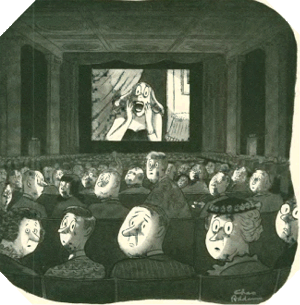 |
| Object, 1936 |
Also known as
Fur-lined Tea Cup, this work is one of
Surrealism’s greatest hits. Its origin lies in a conversation between
Oppenheim,
Pablo Picasso and
Dora Maar at a café in Paris. The story goes that Picasso, complimenting Oppenheim’s fur-trimmed bracelet, noted that just about anything could be covered with fur, to which Oppenheim replied,
“Even this cup and saucer.” Soon after, when Surrealism’s supremo,
André Breton, asked Oppenheim to exhibit in the first Surrealist exhibition dedicated to sculpture, she went out and bought a cup, saucer and spoon and applied pieces of pelt to them. The work’s sexual connotations are unmistakable, but unfortunately for Oppenheim,
Object’s instant success meant that she was never able to top it.
 |
| "just about anything could be covered with fur" |
... Méret Oppenheim (1913-85), Swiss photographic artist, member of the artist Surrealist movement of the 1920s.










